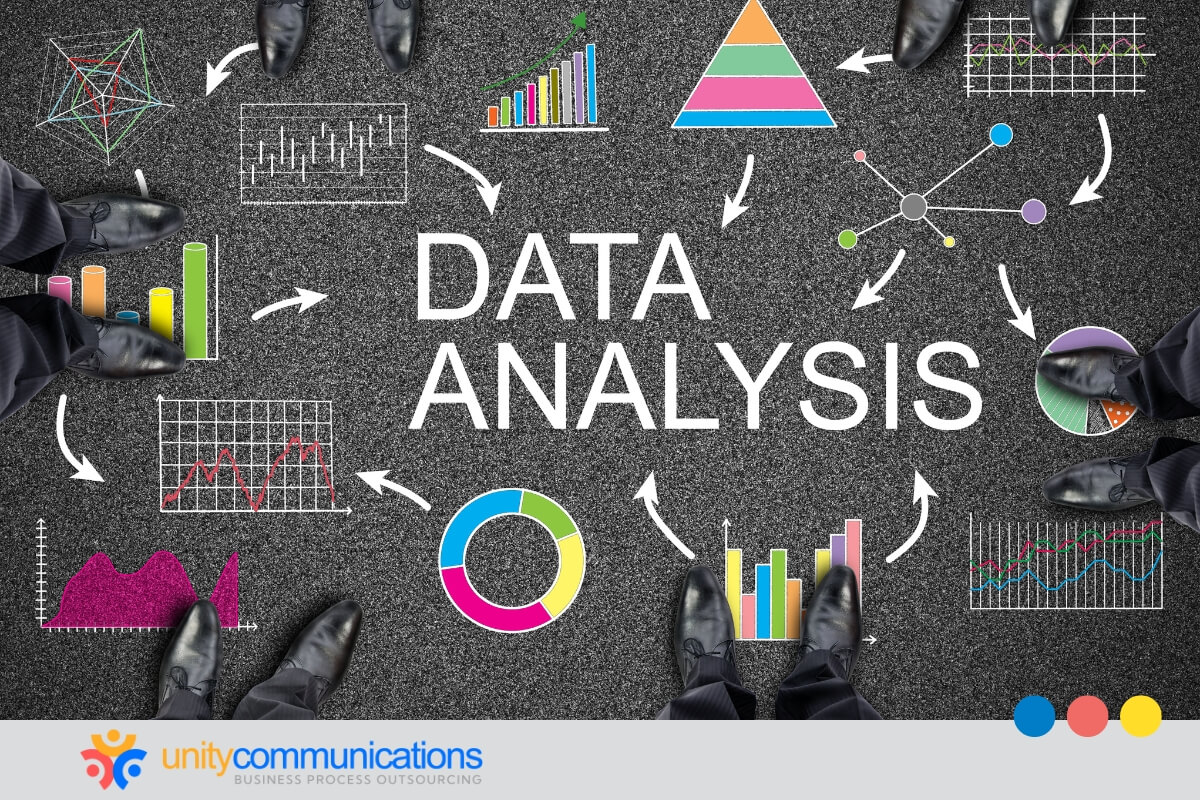IN THIS ARTICLE
Table of Contents
Sports technology is revolutionizing the way athletes perform in competitions. This innovation facilitates real-time analytics generation for team managers, reshaping how they strategize in-game. It also opens up more avenues for fans to experience sports.
The abundance of technology has led many sports organizations to leverage business process outsourcing (BPO) to track and collect sports data. This strategic move allows sports teams to fully concentrate and get their heads in the game.
This article explores the relationship between BPO and sports analytics. It also delves into the advantages of outsourcing sports data collection and analysis. Keep reading!
Importance of BPO Services in Sports Analytics

BPO and sports analytics go hand in hand. BPO teams support teams, organizations, and businesses in the sports industry through specialized services, such as data collection, video analysis, player tracking, and recruitment support.
Outsourcing these functions allows sports organizations to access skilled expertise, advanced technology, and cost-effective solutions, ultimately improving performance and strategic decision-making.
So, what is BPO’s role in sports data analytics? Here are some key data analytics roles BPO fulfills for the sports industry:
- Game tagging and tracking. A sports data tagging provider offers 2D bounding boxes, tags, and tracking services. These tools are instrumental in comprehending key events, player maneuvers, and statistics in the game. They also aid teams in evaluating tactical efficacy for performance enhancement and strategic victories.
- Performance data analysis. The data tagging provider can also meticulously document significant player moments and game incidents to analyze player strengths and weaknesses. Data visualization techniques present insights in an easy-to-understand format, aiding teams in making data-driven decisions.
- Player tracking and tagging. This service lets coaches learn more about each team member’s fitness levels, speed, and stamina. Coaches, team captains, bookmakers, and enthusiasts use sports video tagging.
- Semantic segmentation. Professionals segment and annotate videos using advanced computer vision technology, allowing teams to identify specific components within the video frame by frame. This innovation can evaluate the playing field, perform crowd counting, and more.
- Player segmentation. A subset of semantic segmentation, this service accurately distinguishes and isolates individual players’ in-game footage. It aids teams in closely monitoring and improving player performance for tactical optimization and player development.
- Action identification. This service leverages state-of-the-art machine learning (ML) algorithms to accurately track each player’s actions in-game. Teams use this detailed interpretation of player behavior to refine tactics and enhance player proficiency.
- Player position tracking. BPO teams use sophisticated artificial intelligence (AI) and sensor-based systems to meticulously track player trajectories during games. This granular data enables teams to analyze spatial strategies, optimize player deployment, and make data-driven decisions for superior performance.
- Annotation validation. This service utilizes high-end ML models to scrutinize and verify the authenticity of tagged data, ensuring precision and uniformity. The rigorous validation process provides clients with high-quality data to inform their decisions.
- Players data annotation. Powered by advanced neural network models, this service organizes and labels player data for comprehensive skill evaluation and talent detection. It helps teams optimize player utilization.
- Live player tracking. This service provides up-to-the-minute tracking of player activities and positions during live games. It enables coaches and players to adapt strategies and respond swiftly to the sport’s dynamic nature.
Reasons to Outsource Sports Analytics

The demand for sports and game data tagging services has surged in the expanding realm of sports. Statistics serve various purposes, including maintenance and analysis, live outcome assessment for news broadcasting, and game plan adjustments.
To optimize data tagging efficiently, partnering with a BPO organization is essential. Here are reasons to collaborate with BPO teams and vendors for sports analytics:
- Tracking and analyzing performance. Strategic decision-making relies heavily on performance tracking and analytics. Outsourced analytics aids talent scouting, player deployment, and understanding opponent strategies through advanced statistics. Metrics, such as passes and ball possession, offer key information for strategic planning.
- Increasing data accuracy. Comprehensive sports data management improves data control and access, streamlines accounting, enhances collaboration, and facilitates informed decision-making.
- Providing a valuable reference point. AI-driven advanced analytics in sports are a valuable addition, prompting stakeholders to delegate data capture tasks to external agencies. Third-party providers are crucial in critiquing plays or performances, providing detailed metrics for analysis in sports such as football or hockey.
- Elevating fan engagement. Analytics extends its impact beyond the field, engaging fans in data models and fostering talent development. Interaction with the game becomes more proactive, with computer vision techniques and data mining enhancing fans’ understanding and visibility in the scouting circuit.
- Predicting teams’ behavior. In-play sports data capture aids in predicting the opponent team’s strategies, such as specific areas of dominance on the field. Sports tech contributes to measuring metrics and forecasting behavior, offering valuable insights for strategic planning during matches.
- Focusing on player education and training. Real-time data capture during sporting events allows team managers to create playlists for players based on specific shots or moments. For instance, a playlist focused on penalty shots in the box area can help players identify trends or weaknesses, enabling strategic adjustments in future matches.
How Outsourced Analytics Enhances Performance and Strategy

Outsourced sports analytics has become increasingly popular as teams and organizations seek a competitive edge. Here are several ways BPO teams and outsourced sports analytics can enhance overall performance and strategy:
- Advanced metrics. Outsourced sports analytics firms use sophisticated tools and technologies to collect and analyze vast amounts of data, providing teams with insights into player performance, team dynamics, and opponent strategies.
- In-game analysis. Real-time analysis during games allows coaches to make informed decisions based on current data, such as player fatigue, opponent patterns, and situational tactics.
- Injury prevention. Analyzing player movements and physical data can help identify patterns that may lead to injuries. This information allows teams to develop training programs to reduce the risk of injuries and optimize player performance.
- Skill development. By analyzing individual player statistics and performance metrics, coaches can identify strengths and weaknesses and create targeted training programs to enhance specific skills.
- Game strategy. Sports analytics firms can provide in-depth analysis of opponents, identifying patterns, weaknesses, and tendencies. This information is crucial for developing effective game strategies and making real-time adjustments during matches.
- Scouting reports. Detailed scouting reports on individual players or opposing teams help coaches make informed decisions about player matchups and tactical approaches.
- Player evaluation. Outsourced analytics can assist in evaluating potential recruits or draft picks by analyzing their performance metrics, physical attributes, and overall potential. This information aids the recruitment process.
- Salary cap management. Analyzing player performance in relation to their salary allows teams to make informed decisions about player contracts and salary cap allocations.
- Data-driven fan engagement. Analytics helps to understand fan preferences, behavior, and engagement levels. Teams can leverage to create targeted marketing campaigns, improve fan experiences, and enhance their overall brand appeal.
- Cutting-edge technology. Around 49% of businesses outsource to gain new capabilities. Outsourced firms often have access to the latest technology and analytical tools, helping teams stay at the forefront of innovation in sports analytics.
- Custom solutions. Outsourcing allows teams to benefit from customized solutions tailored to their specific needs, whether it’s player performance analysis, injury prevention, or opponent scouting.
- Resource optimization. Outsourcing sports analytics can be cost-effective and save 70% of labor costs, as teams can avoid investing heavily in building and maintaining an in-house analytics team. It also allows organizations to allocate resources more efficiently.
The Bottom Line
The role of BPO in sports analytics is multifaceted, encompassing performance analysis, data management, reference points, fan engagement, team behavior, and player education and training.
Outsourcing sports analytics provides teams access to advanced technologies, specialized expertise, and data-driven insights that can significantly enhance performance, strategy, and overall competitiveness in the sports industry.
Let’s connect if you want to learn more about the interplay between BPO and sports analytics.





